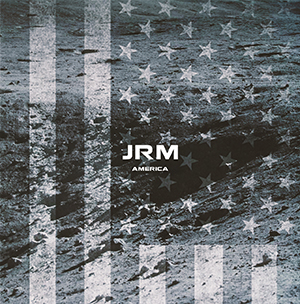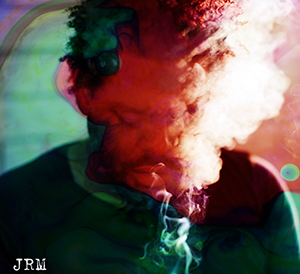JRM
“America”
In less than three minutes, on an acoustic guitar, JRM sums up the experience of being a black man in the United States. “America” is an unintentional protest song written by the successful songwriter-for-hire on an acoustic guitar at 5am while hanging out with his friends. They were joking about on a stoop outside a house in Glendale after an all-night bender. It was a moment in which the mood turned from jovial to very serious. Notably, this off-the-cuff songwriting session happened three years at the beginning of Trump's Presidency. Even though the song was written before the widespread conversation taking place in 2020, its messages ring out like a premonition of the united rage that was on the horizon. The message of “America” is impossible to ignore after protests for Black civil rights have reignited amid new cases of police brutality – the deaths of George Floyd, Breonna Taylor and Ahmaud Arbery, in particular.
JRM is Jaramye Daniels, an LA-based, Philadelphia native who has become a Grammy-nominated songwriter and vocalist for the likes of Beyoncé (“All Night”), Martin Garrix (“Summer Days”), Jessie Reyez (“Imported”), Teyana Taylor, Kygo and Lukas Graham. His career has picked up pace since relocating to Los Angeles in 2015. Prior to that, JRM always dreamed of making music a career but had never hedged all his bets on it. He grew up in a traditional Jamaican home, with two immigrant parents, in Philadelphia. The house was one of celebration, music, and gatherings. JRM remembers being surrounded by vinyl records: classic reggae (Bob Marley, The Skatalites, Beres Hammond) and soul (Chaka Khan, Earth Wind & Fire). JRM would sing in church but he was always shy to perform. He knew his voice was special and yet he was reticent to show it. So he never sang for people in school, or in college during his Business degree at Howard University in DC. Yet the idea of doing music never left him.
After his undergraduate degree, JRM returned to Philadelphia, and realized that if he wanted to be an artist he'd either have to take pre-written songs, or write songs himself. “I didn't wanna cut these songs that I hated,” he says. JRM had already begun to tour as a backing vocalist, and still he was stage shy. Unsure of how to get over that hump, he went to culinary school for a year. Once that was over, he fell in love with a girl in New York, moved there, found a manager, and seriously committed to developing his songwriting craft.
For his first solo release “America” feels especially heavy. It felt that way when he wrote it. “It wasn't a new feeling,” he explains. “When all this shit started happening I knew it had to come out.” Since the song was written, JRM's been reluctant to release it. He didn't want it to be the first song of his own artistry. He didn't want it to define him. JRM is a happy-go-lucky dude, the life and soul of the party, always bringing joy to the room. His perspective on that changed, however, when he saw a new energy in this uprising, and witnessed so many white allies join in the fight for black lives. “It hits a lot harder in this current climate,” he says. He felt a renewed responsibility to teach his white friends about the black experience. Even having one of those friends produce “America” wound up being a conversation in itself, as JRM wondered if his lyrics were too much, and received encouragement and a space in which to just express his anguish.
Ultimately, “America” is a plea for acknowledgement. It's about increasing awareness, shouldering his own responsibility in the conversation, using the voice he's always know he had during this most pertinent time in history to use it. “If your heart ain't heavy, you ain't scared enough…” go the lyrics. “I need to let people know that we have felt this way for a long time,” explains JRM. “It's not just now that we're trying to navigate this country. We've been feeling like this forever. But what's happening now has given me a kick in the ass.”
“America” will be released on JRM's independent label Short Weeks. It sees him finally leave his insecurities behind. “I'm a black man born and raised in America to immigrant parents,” he says, proud. “This is what the country is fighting for right now.”■
For more information, please contact Louis D’Adamio or Carla Sacks at Sacks & Co., 212.741.1000.

